Google Ratings vs. Reviews: Important Differences Explained (2025 Updates)
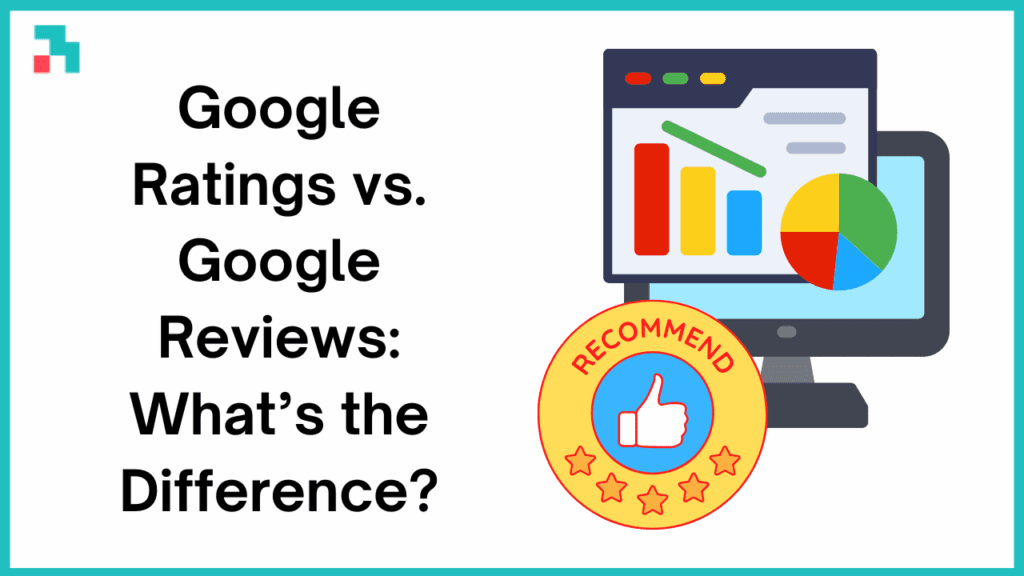
For entrepreneurs and business owners, understanding how Google rankings and reviews work together is crucial.
Your Google ranking determines how visible your business is in search results and on Maps, while your reviews shape how potential customers perceive you. Together, they can make or break your online success.
Think of it this way: your Google ranking gets people to find you, but your reviews make them choose you.
High-quality, authentic reviews not only boost your credibility with customers but also send strong signals to Google’s algorithm that your business deserves to rank higher.
In this guide, we’ll explain the key differences between Google ratings and reviews, how they influence your visibility, and, most importantly, how to use them strategically to improve your Google ranking.
Ultimately, these insights will help you turn positive feedback into real growth regardless of what time of business you run. Let’s check it out.
Table of Contents
What Are Google Ratings and Reviews?
If you’ve ever searched for a local business on Google, you’ve seen those golden stars and snippets of feedback that pop up under the business name.
Those stars represent Google ratings, and the comments people leave are Google reviews. They work together to shape how potential customers see your brand, and more importantly, how Google ranks your business in search results.
A Google rating is a simple numerical average, based on the stars customers give your business. Each person can rate you from 1 to 5 stars, and Google averages them out to display a single score, like 4.6 or 3.8.
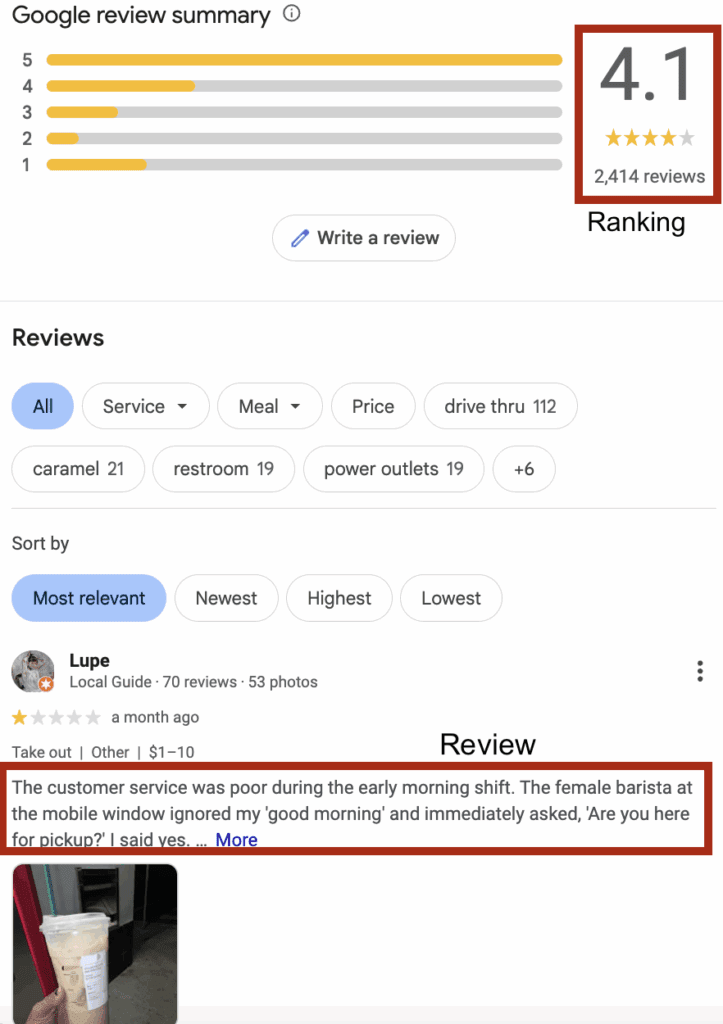
A Google review, on the other hand, includes both a rating and written feedback. Reviews give context to the rating, explaining what customers liked, what could improve, and whether they recommend your business to others.
In short, ratings are the numbers, but reviews are the stories behind those numbers. And both matter. Let’s find out how.
Ratings Show Trust at a Glance
When customers are scrolling through Google Maps or Search, they make split-second decisions based on star ratings.
A business with a 4.7 average instantly feels more trustworthy than one sitting at 3.2. Ratings are your first impression; they tell potential customers whether you’re worth a click.
Reviews Build Connection and Credibility
Reviews take that trust further by sharing experiences. They let future customers understand what doing business with you actually feels like.
Whether it’s “fast service, clean space, friendly staff” or “slow delivery, unresponsive customer support,” reviews give context that helps people decide if you’re the right fit.
Together, ratings and reviews influence both your reputation and your Google ranking, making them key tools for business visibility and credibility.
The Importance of Google Ratings and Reviews
If you want your business to rank higher on Google and attract more customers, ratings and reviews are non-negotiable.
They’re among the most powerful signals Google uses to determine where your business appears in search results.
Google wants to connect users with the best, most trustworthy local options—and reviews play a huge part in how it makes that decision.
Impact on Local Search Rankings
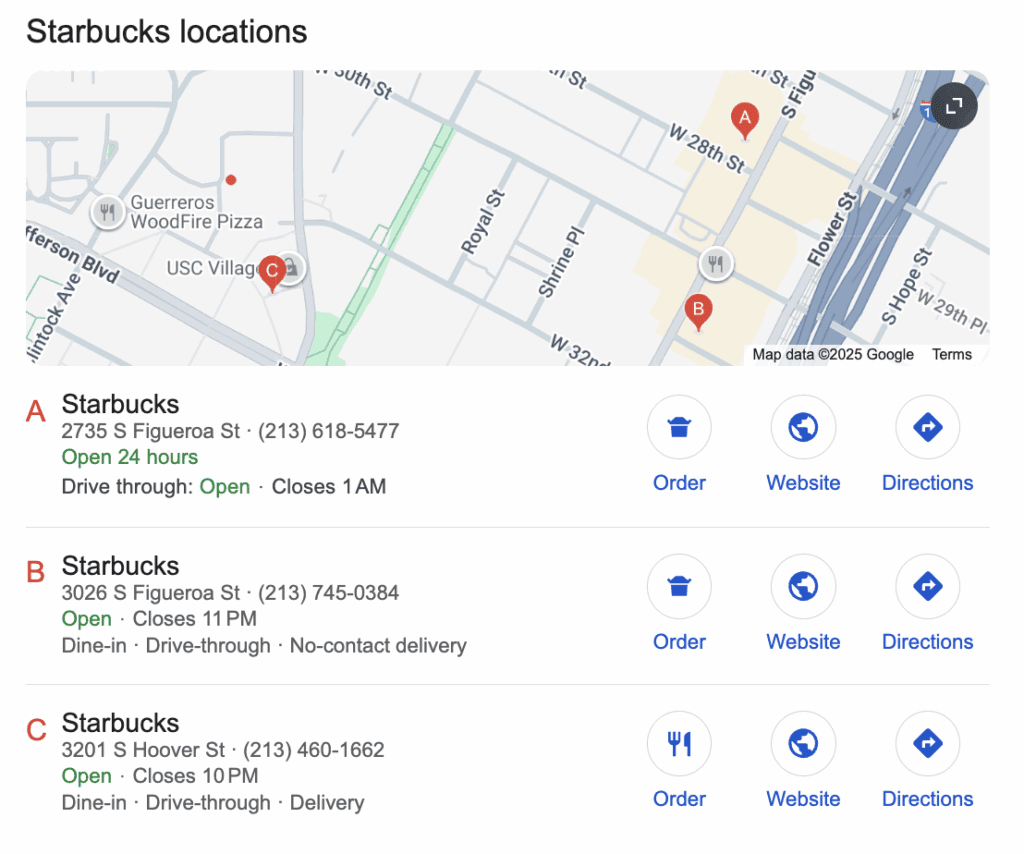
Your Google ranking (the position where your business appears in local search results) depends on many factors. But reviews are one of the most influential.
When someone searches “best pizza near me” or “marketing agency Los Angeles,” Google looks at three main things:
- Relevance – How closely your business matches the search terms
- Distance – How close your business is to the searcher
- Prominence – How well-known and trusted your business is
It does consider distance as a key factor; however, even a location that is farther away will be recommended first if it has better reviews!
Reviews directly affect prominence. A business with a high average rating and a consistent flow of fresh reviews looks more trustworthy to Google’s algorithm.
It signals quality, popularity, and reliability, all traits that make Google more likely to feature you at the top of local results.
The more positive and detailed reviews you earn, the more Google recognizes your business as credible. That, in turn, improves your local SEO rankings and pushes you higher on maps and search listings.
Impact on Conversions
Even if your business shows up high on Google, reviews are what actually convince customers to click, call, or buy. Think of them as your online word-of-mouth marketing.
A 4.8-star business with hundreds of positive reviews looks like a safe bet. People trust it more and are far more likely to take action.
In fact, studies show that businesses with strong Google reviews can see up to a 30% increase in conversion rates compared to those with weak or inconsistent feedback.
Good reviews don’t just bring traffic: they bring qualified traffic. When customers read genuine feedback that aligns with their needs, they’re more likely to commit.
And it’s not just about having lots of reviews; you need to have the right kind.
A mix of detailed, recent, and balanced reviews helps you look authentic and approachable. That combination builds confidence, which directly translates to more leads, sales, and bookings.
How Google Ratings Influence Your Google Ranking
Let’s dig deeper into how Google’s system works. Google doesn’t just look at how many reviews you have; it evaluates the quality and consistency of those reviews over time.
Here are a few ways ratings influence your overall Google ranking:
- Average Star Rating: A higher rating generally leads to higher visibility, especially in the local 3-pack: the top three results that appear in Google Maps.
- Volume of Ratings: The more reviews you have, the more reliable your score looks to Google’s algorithm. Businesses with dozens or hundreds of ratings tend to outrank those with just a handful.
- Recency: Fresh reviews carry more weight. A business with 10 new reviews in the past month looks more active and relevant than one with old feedback from years ago.
- Response Rate: Google rewards businesses that engage with customers. Responding to reviews, whether positive or negative, shows that you care about customer experience.
In essence, your Google ranking improves when you consistently earn honest feedback from real customers and maintain a high star average. Be sure to avoid Google reviews mistakes and put your best foot forward online.
How Google Reviews Help You Stand Out
While ratings help you get noticed, reviews help you stand out from competitors. Two businesses might both have 4.6-star averages, but the one with detailed, well-written feedback will attract more customers.
That’s because people don’t just look at numbers; they read the stories behind them. Reviews humanize your brand, allowing potential customers to see what makes you unique.
Here’s how reviews help you go beyond the numbers:
- Showcase your strengths: Customers often mention specific things they loved—like your customer service, product quality, or speed.
- Handle negative feedback gracefully: When people see that you respond to criticism professionally, it builds trust instead of hurting your brand. You can respond to negative Google reviews the right way and build back reputation points.
- Highlight real experiences: Reviews often describe the customer journey, giving future buyers confidence in what to expect.
If you’re consistently earning reviews that tell your story and show real customer satisfaction, you’ll naturally outperform businesses that rely only on ratings.
Why Businesses Should Monitor Both Ratings and Reviews
Successful entrepreneurs treat ratings and reviews as an ongoing part of their marketing strategy—not just something that happens in the background. Monitoring them helps you:
- Spot service or product issues early
- Engage directly with customers to build loyalty
- Improve your reputation score and ranking over time
- Identify brand advocates who can help promote your business
Regularly reading and responding to reviews shows both customers and Google that you care.
It signals transparency, accountability, and commitment: all traits that make your business more trustworthy in the eyes of both algorithms and people. Google reviews are reliable, and they no doubt drive customer action.
How to Improve Your Google Ranking Through Reviews
If your goal is to move up in Google’s local rankings and get your business in front of more people, your Google reviews play a massive role.
They’re one of the most influential local SEO signals because they prove to Google, and to your potential customers, that your business is active, trusted, and worth showing first.
But improving your Google ranking through reviews isn’t about gaming the system or chasing fake 5-star feedback.
It’s about creating a consistent, authentic review strategy that builds credibility over time. Below are five expanded strategies to help your business climb the Google ladder the right way.
1. Ask Customers for Feedback Regularly
The most important step is simply asking. Many satisfied customers don’t think to leave a review unless prompted. By politely and consistently asking for feedback, you can build a steady flow of authentic reviews.
Looking For Google Reviews? Claim your Discount Below
Timing is key. Ask for reviews immediately after a positive interaction or transaction, while the customer’s experience is still fresh.
For example, a café could send a thank-you text right after an order is completed, or a home repair company could follow up a day after finishing a project.
You can also personalize your requests. Instead of generic messages like “Please leave a review,” try:
“Hi Sarah! We loved helping you today. Could you share your experience with us on Google? Your feedback helps other customers discover our business.”
When you make the request specific, warm, and convenient, customers are far more likely to respond.
Pro tip: Incorporate review requests into your existing customer journey: thank-you emails, SMS updates, or checkout receipts. The smoother the process, the higher your response rate.
2. Make It Simple
Leaving a review should never feel like a chore. If your customers have to search for your business manually, navigate menus, or log in repeatedly, you’ll lose their attention.
The key to getting more Google reviews, and improving your Google ranking, is reducing hassle.
You can do this by sharing your direct Google review link. You’ll find it in your Google Business Profile dashboard under “Ask for Reviews.”
Copy that link and place it wherever customers interact with your brand:
- At the bottom of receipts or invoices
- In email signatures and newsletters
- In SMS follow-ups
- On your website’s “Contact Us” or “Thank You” pages
You can also generate a Google reviews QR code that links directly to your review page. Print it on menus, business cards, product packaging, or window signs so customers can scan and leave feedback in seconds.
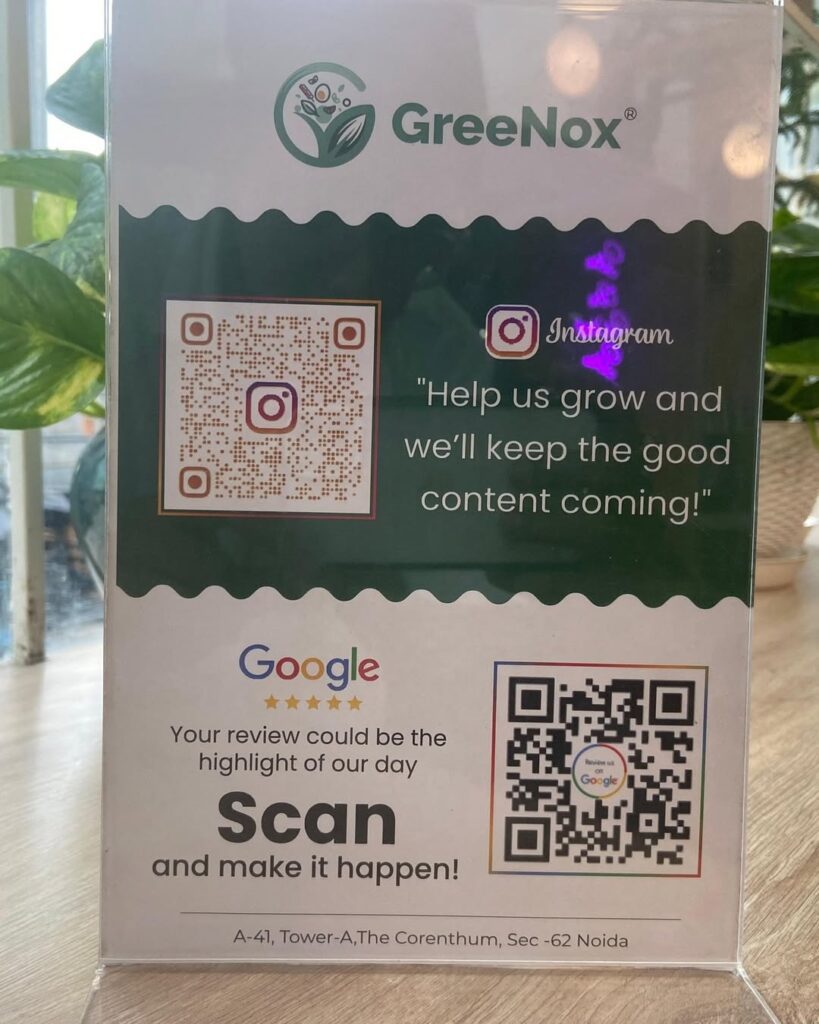
When you make it easy and effortless, you’ll see a significant increase in both the quantity and frequency of your reviews, both of which signal to Google that your business is active and trusted.
3. Respond to All Reviews—Positive and Negative
One of the most underrated factors in improving your Google ranking is engagement. Google wants to highlight businesses that actively manage their online presence.
That means responding to reviews—not just reading them.
When you reply to positive reviews, you show appreciation and strengthen customer relationships. A quick “Thank you for choosing us!” or “We’re so glad you enjoyed your experience!” helps humanize your brand.
When you respond to negative reviews, you demonstrate accountability and professionalism. Even a simple, polite response like, “We’re sorry you had this experience.
Please reach out so we can make it right,” shows both Google and future customers that you value feedback and aim to resolve issues.
Google’s algorithm notices this activity. Active responses signal that your business is engaged, customer-focused, and trustworthy.
That engagement can slightly boost your ranking and make your listing more appealing to users.
Bonus benefit: Potential customers who see thoughtful, calm responses are more likely to give your business a chance—even if you have a few less-than-perfect ratings.
4. Stay Consistent
Consistency is the difference between a thriving Google profile and one that fades into obscurity. Google favors businesses that receive reviews regularly over time, not those that suddenly get 50 reviews in a week and then nothing for months.
A consistent flow of reviews tells Google that your business is still active, still attracting customers, and still relevant. It also prevents your listing from looking stale. People tend to trust recent feedback more than old ones.
Not only that, they’re able to filter the Google ratings and reviews by newest first, so you really need to make sure you are consistently getting new reviews.
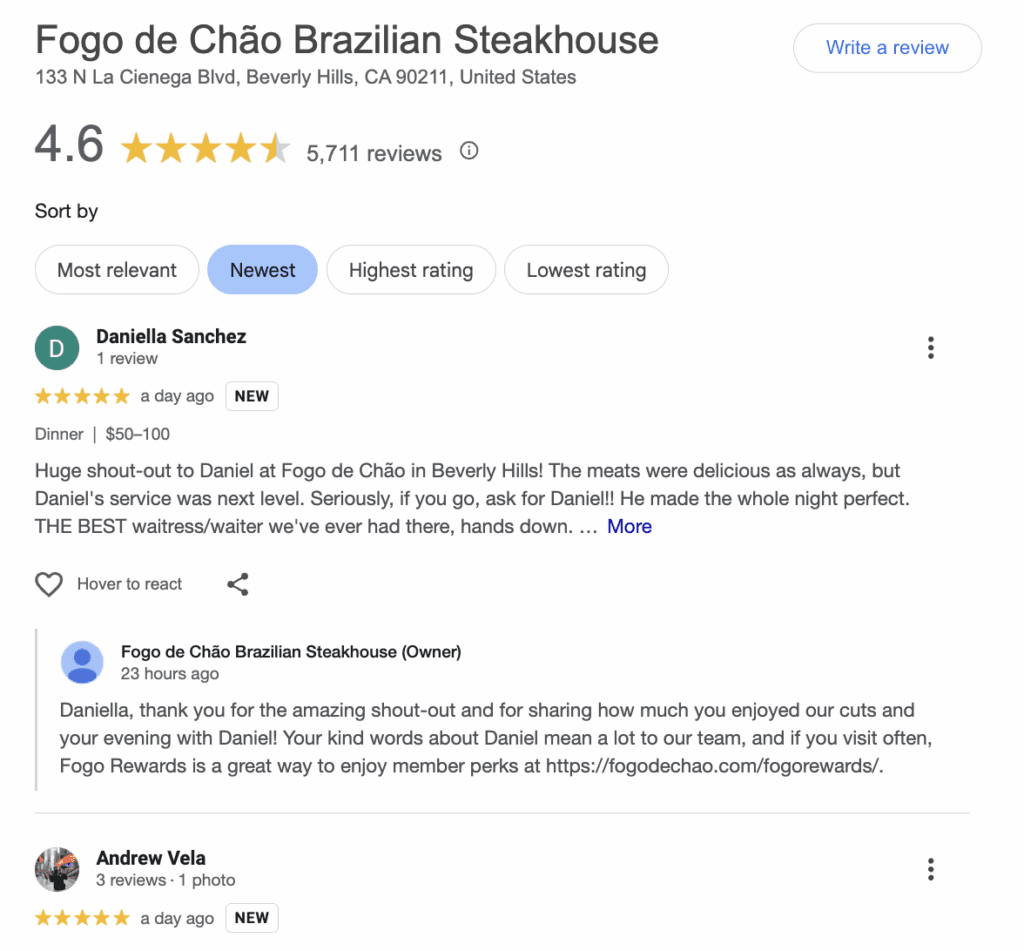
You can maintain this consistency by making review requests part of your regular operations. Train your staff to ask for reviews after every transaction or follow up digitally at key points in your customer journey.
If you have seasonal spikes in business, plan review pushes accordingly. For example, a landscaping company might encourage Google reviews during spring and summer, while a retail store might focus on the holiday season.
Over time, this steady pattern builds credibility in Google’s eyes, boosting your ranking and making your profile look naturally popular.
Pro tip: Track your review cadence with a simple spreadsheet or analytics tool. If you notice a slowdown, ramp up your outreach to maintain momentum.
5. Deliver Great Experiences That Earn Great Reviews
You can’t improve your Google ranking without earning positive, genuine feedback—and that starts with delivering outstanding customer experiences. When people are happy, they talk about it. When they’re impressed, they share it online.
Exceptional service is your best SEO strategy. Every great interaction creates an opportunity for a glowing review that boosts your reputation and ranking.
To encourage more 5-star feedback, focus on the small details that make your customers feel valued:
- Be responsive—answer calls, emails, and messages quickly.
- Go above and beyond—solve problems efficiently and exceed expectations.
- Personalize your interactions—use names, remember preferences, and make people feel seen.
Satisfied customers become brand advocates. And every time one of them leaves a detailed review, it not only improves your average rating but also signals to Google that your business deserves more visibility.
Pro tip: Don’t be afraid of a few 4-star or even 3-star reviews. A realistic mix looks authentic and can actually improve trustworthiness. The goal isn’t perfection—it’s credibility.
Bringing It All Together
Improving your Google ranking through reviews is about steady, honest effort, not shortcuts. When you ask regularly, make the process simple, engage with reviewers, stay consistent, and deliver exceptional service, you’ll naturally attract more positive feedback.
Google rewards authenticity. A business with hundreds of organic, well-managed reviews will always outrank one that tries to buy or manipulate its way to the top.
So focus on real relationships and real customer satisfaction because that’s what both Google and your audience value most.
In the end, your reviews don’t just boost your ranking; they build your brand. They turn customers into marketers, ratings into reputation, and feedback into growth.
Final Takeaways: Google Ratings vs. Reviews

Google ratings and reviews might seem similar, but they serve different and equally important purposes. Ratings give quick credibility, while reviews provide depth, authenticity, and engagement.
Together, they form the backbone of your online reputation.
For entrepreneurs and business owners, managing both is essential. High ratings attract clicks, but great reviews convert those clicks into loyal customers.
By focusing on authentic feedback and consistently engaging with your audience, you’ll not only build trust but also climb higher in Google’s local rankings.
In short, your Google rating gets people’s attention, but your reviews make them stay. When managed together, they’re your most powerful digital marketing tools.
FAQs
What’s the difference between Google rating and Google review?
A Google rating is the star score (1–5) a customer gives your business, while a Google review includes that rating plus written feedback. Ratings summarize customer satisfaction, and reviews explain it in detail.
How do ratings and reviews affect my Google ranking?
Both ratings and reviews influence your Google ranking. Businesses with high averages, consistent review activity, and recent feedback are more likely to appear at the top of local search results.
Can I improve my Google ranking by getting more reviews?
Yes, as long as they’re real and organic. Google values businesses that regularly earn authentic feedback from real customers. More high-quality reviews can increase your visibility and trust score.
Do negative reviews hurt my Google ranking?
Not necessarily. A few negative reviews can actually make your profile look more realistic. What matters most is your overall average rating and how you respond to criticism.
How often should I ask for Google reviews?
Aim to request reviews regularly, not in large batches. Asking consistently after customer interactions helps your business appear active, reliable, and relevant in Google’s algorithm.
